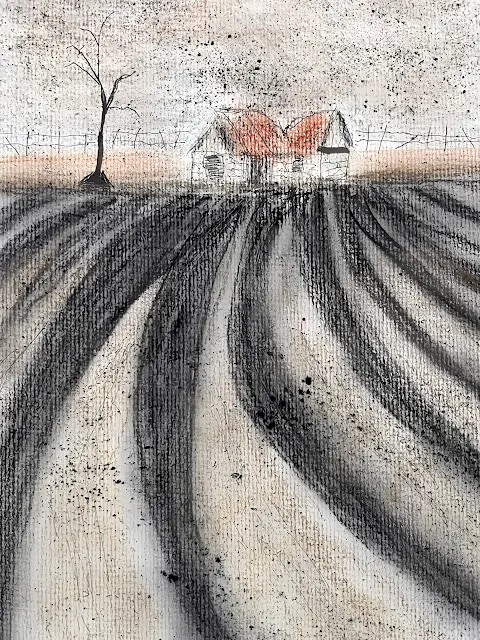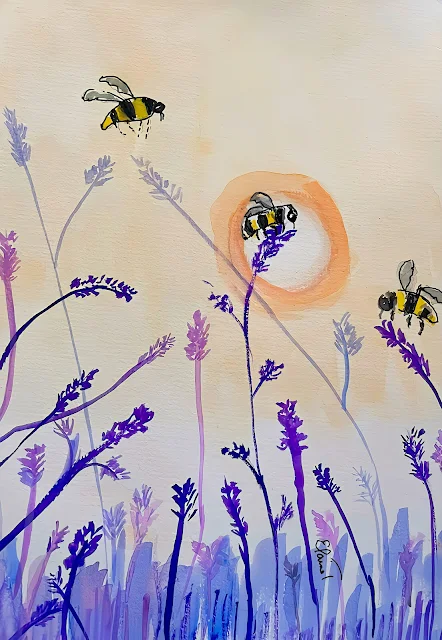The Pocket Watch
continued
Someday Soon
Harley stood frozen in the parlor, his feet rooted to the spot, yearning to chase after his son but unable to move. He was consumed by regret for his fiery words, which he couldn't take back. "You're no son of mine!" The phrase echoed in his mind, reminding him of his own father's hurtful words when he left home years ago.
Harley heard Grace come down the stairs. “I know you didn’t mean it, Harley,” she said. “Chris knows it, too, somewhere in his heart. He’ll come home when he realizes it.” She put a hand on his shoulder. “He just wanted to quit school to help us,” she explained, tears glistening.
The drought continued and the winds picked up the dead earth and dumped it back upon them, thick black blizzards, burying some homes altogether. If not the blizzards, then the banks swooped in like vultures eating carrion.
continued
Someday Soon
Harley stood frozen in the parlor, his feet rooted to the spot, yearning to chase after his son but unable to move. He was consumed by regret for his fiery words, which he couldn't take back. "You're no son of mine!" The phrase echoed in his mind, reminding him of his own father's hurtful words when he left home years ago.
Harley heard Grace come down the stairs. “I know you didn’t mean it, Harley,” she said. “Chris knows it, too, somewhere in his heart. He’ll come home when he realizes it.” She put a hand on his shoulder. “He just wanted to quit school to help us,” she explained, tears glistening.
The drought continued and the winds picked up the dead earth and dumped it back upon them, thick black blizzards, burying some homes altogether. If not the blizzards, then the banks swooped in like vultures eating carrion.
Grace and Harley owned their own home. They vowed to stay put. They’d be there, for Chris, when he came home. “Someday soon,” they said.
So, they hunkered down in the hand dug tornado shelter and cold cellar whereGrace stored jars of canned fruits, jams, and vegetables.
But the food ran out and the drought continued. More than once the bank tried to coerce them into selling off their farmland, laid bare by drought. But Grace and Harley hung on. “This is Chris’s home,” they’d say, “and we will not sell! We’ll die here if we must.”
In town there was an old shipping warehouse where the bank stored all the farm equipment, the spoils of drought and famine. Harley went to work for the bank, repairing the farm equipment.
“I’m a traitor to our neighbors!” he admitted to Grace.
“But they are all gone now, Harley, and you are not to blame!”
“But I’m working for the enemy now!” His voice broke. “How can I ever live with myself again?”
They sat in the darkened kitchen, inches of dirt covering everything.
They dined that night well on bread and bacon. Two hens squawked and pecked at the crumbs they let fall. The bank paid Harley in food and clean water. It was enough to get by, barely.
Harley’s guilt weighed heavily on him, slumping his shoulders, aging him much too soon. Several years passed.
Soon the bank abandoned the hope of selling the farm equipment, and the tractors became rusting skeletons as the warehouse decayed around them. The banks, too, were shuttered.
Hope came in the form of President Roosevelt’s Civilian Conservation Corps. Harley quickly signed up for $30 a month, most of which was sent to Grace directly from the CCC.
“I’ll see you real soon, Grace. I have to do this, to save the land … and myself,” he choked up. “How I love you, my Gracie.” Then he was gone.
At long last the rains returned to the Dust Bowl, and with it the promise of renewal, though it would be another decade of hard, back breaking work.
Harley and Grace, together again, began the work of rebuilding their life together.
Harley had an idea, a way to help his community even more. “Grace, I have a crazy idea.”
“If it involves leaving this farm, forget it!” she said.
“No, never that,” he paused. Taking her hand. “We need honeybees!”
“Honeybees? You want us to make honey? she asked, no bit of shock in her voice. “But we’re grain farmers…”
“Of course we are, but maybe beekeepers, too,” he replied. “Bees for the fields of grain that will soon return to Kansas. That can never happen without pollinators,” he explained. “What do you say?”
“What do I say? She wrapped her arms around him. “I think,” she paused. “I think I married a genius!”
With hard work, the Harmon Bee Farm saved many a farm in Kansas. Grace and Harley prospered over the next twenty years.
So, they hunkered down in the hand dug tornado shelter and cold cellar whereGrace stored jars of canned fruits, jams, and vegetables.
But the food ran out and the drought continued. More than once the bank tried to coerce them into selling off their farmland, laid bare by drought. But Grace and Harley hung on. “This is Chris’s home,” they’d say, “and we will not sell! We’ll die here if we must.”
In town there was an old shipping warehouse where the bank stored all the farm equipment, the spoils of drought and famine. Harley went to work for the bank, repairing the farm equipment.
“I’m a traitor to our neighbors!” he admitted to Grace.
“But they are all gone now, Harley, and you are not to blame!”
“But I’m working for the enemy now!” His voice broke. “How can I ever live with myself again?”
They sat in the darkened kitchen, inches of dirt covering everything.
They dined that night well on bread and bacon. Two hens squawked and pecked at the crumbs they let fall. The bank paid Harley in food and clean water. It was enough to get by, barely.
Harley’s guilt weighed heavily on him, slumping his shoulders, aging him much too soon. Several years passed.
Soon the bank abandoned the hope of selling the farm equipment, and the tractors became rusting skeletons as the warehouse decayed around them. The banks, too, were shuttered.
Hope came in the form of President Roosevelt’s Civilian Conservation Corps. Harley quickly signed up for $30 a month, most of which was sent to Grace directly from the CCC.
“I’ll see you real soon, Grace. I have to do this, to save the land … and myself,” he choked up. “How I love you, my Gracie.” Then he was gone.
At long last the rains returned to the Dust Bowl, and with it the promise of renewal, though it would be another decade of hard, back breaking work.
Harley and Grace, together again, began the work of rebuilding their life together.
Harley had an idea, a way to help his community even more. “Grace, I have a crazy idea.”
“If it involves leaving this farm, forget it!” she said.
“No, never that,” he paused. Taking her hand. “We need honeybees!”
“Honeybees? You want us to make honey? she asked, no bit of shock in her voice. “But we’re grain farmers…”
“Of course we are, but maybe beekeepers, too,” he replied. “Bees for the fields of grain that will soon return to Kansas. That can never happen without pollinators,” he explained. “What do you say?”
“What do I say? She wrapped her arms around him. “I think,” she paused. “I think I married a genius!”
With hard work, the Harmon Bee Farm saved many a farm in Kansas. Grace and Harley prospered over the next twenty years.
But they never left their prairie home or their prairie lifestyle behind. “Someday soon,” they’d say. “Someday soon.”
Finally, after almost thirty years that day came.
Chris stood outside room 310 at Community Hospital, hesitant to reunite with his parents. But as he entered, he found an elderly couple, familiar yet worn by time.
The room smelled of lavender, his mother's soap. He relaxed.
“Hi, Dad," he said softly. "I'm here to drive you and Mom home."
Did you like the conclusion to “The Pocket Watch?” Let me know! I’m listening.
Etlainie92@gmail.com
Etlainie92@gmail.com
 |
| Dorothea Lange, famed photographer of the Dust Bowl, took this photo of a family fleeing famine, moving westward |


